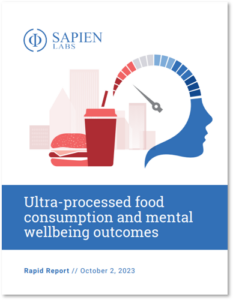Consumption of ultra processed food and mental wellbeing outcomes
October 2, 2023
There has been increasing attention on ultra-processed food (UPF) as the cause various of diseases, particularly in countries such as the United States and United Kingdom, where the majority of calories consumed today come from UPF.
While much of the focus has been on obesity, diabetes, and more recently, heart disease, the mind too is not exempt from its effects. Studies showing a link between UPF consumption and depression are growing. This includes a recent study that demonstrates an improvement of depression symptoms, even with just three weeks of diet change in those who regularly consume a diet of UPF placing UPF consumption as a core cause.
But just how far reaching are the effects of UPF on mental health? Here we look at the self-reported frequency of UPF consumption and its relationship to the full breadth of mental health symptoms, and aggregate mental wellbeing, in a global sample of almost 300,000 people.
Key Findings:
- Mental wellbeing decreases sharply with more frequent UPF consumption. Those who consume UPF several times a day are three times more likely to have serious mental health struggles compared to those who rarely or never do.
- While younger adults consume UPF more frequently, UPF consumption has a similar impact on all age groups.
- The decline in mental wellbeing with increased frequency of UPF consumption cannot be attributed to indirect effects of exercise frequency or income.
- Higher frequency of UPF consumption impacts all dimensions of mental function from Adaptability & resilience to Cognition.
- Depression symptoms and problems with cognitive and emotional control dominate with higher frequency of UPF consumption.
- Among 26 countries compared, respondents in the Philippines, United States and United Kingdom reported the highest consumption of UPF, while those in Egypt, Morocco and Venezuela reported the lowest.
WHAT IS MENTAL WELLBEING? Mental wellbeing reflects our mental capability and functioning, as well as our ability to navigate and cope with life’s stresses. It is not the same as happiness or life satisfaction. You could, for example, be experiencing very difficult or sad circumstances in your life but nonetheless have all the capabilities to cope as best as one could, and therefore have a high level of mental wellbeing.
Download Report In English
Download Report in Spanish
Download Statistics Tables
View Data Graphs
Cite this report as:
Ultra-processed food consumption and mental wellbeing outcomes, Global Mind Project, Sapien Labs, October 2, 2023.
This study uses global data from 292,786 respondents aged 18 to 75+ obtained between January and August 2023 through the Global Mind Project. It acquires data using the MHQ assessment that spans 47 elements covering a wide range of symptoms and mental capabilities and provides aggregate scores of mental wellbeing and its dimensions. This report examines the relationship between people’s consumption of UPF and their mental wellbeing.
It’s important to note that this data is from online respondents and does not include people without internet access. This will have a bigger impact in some developing countries where many communities live offline.
As featured in:







